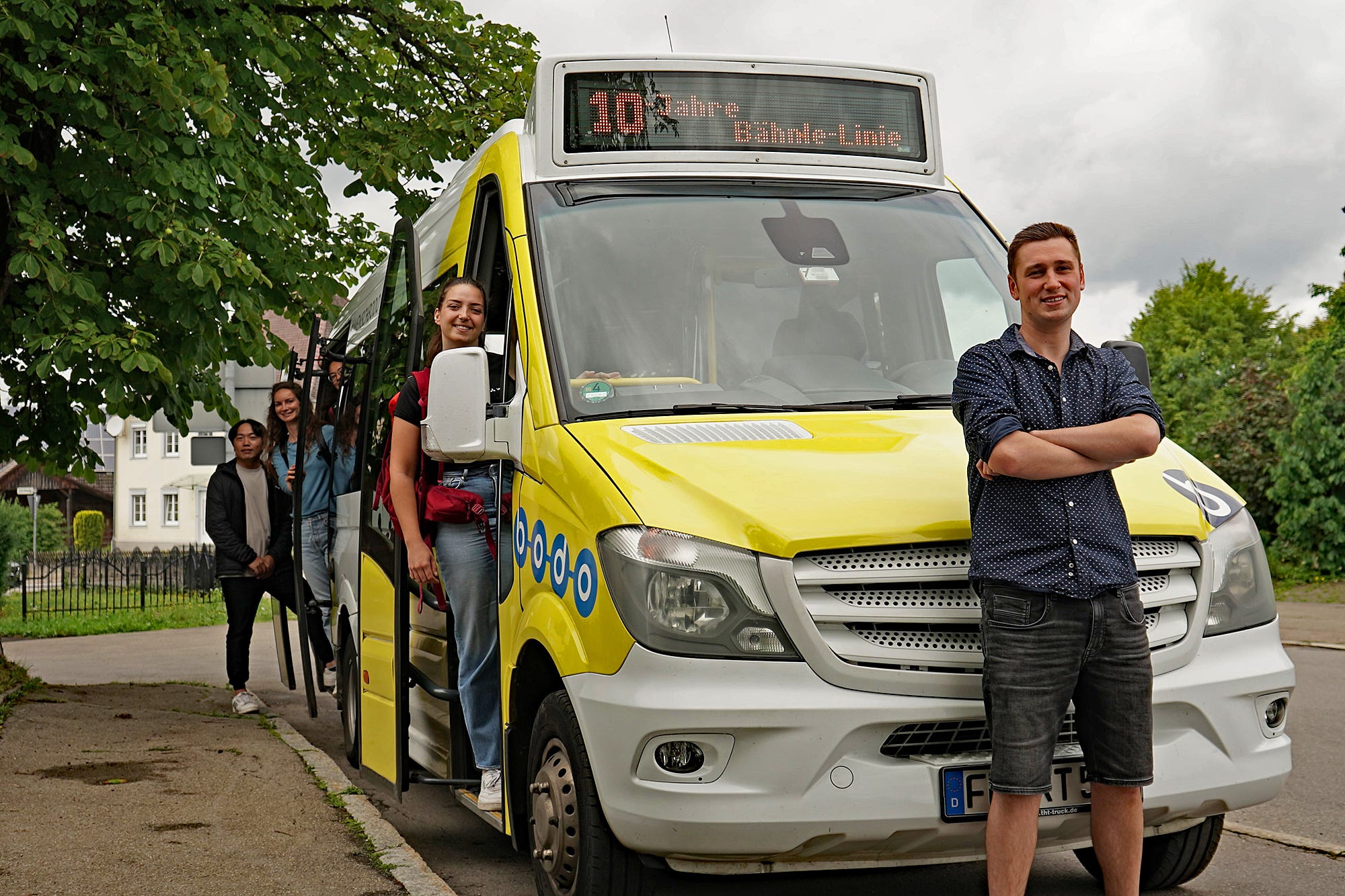VAUDE and bodo are pleased about ten years of Bähnle line
08.08.2023 -Ten years ago, on September 30, 2013, bus line 229, affectionately known as the Bähnle line, ran for the first time from Meckenbeuren station via Tettnang to Obereisenbach. Together with other companies, the public administration and public transport stakeholders, VAUDE had taken the lead at the time in ensuring that the company location in Obereisenbach received a connection to the public bus network. The aim was to offer the people of the region a reliable, environmentally friendly and cost-effective alternative to driving. In the meantime, the bus line has become firmly established and is popular not only with commuters but also with citizens. It is a fine example of how the transport revolution can succeed in rural areas.
"When I get on the bus in the morning and know both the bus drivers and passengers, it's a nice personal start to the day," says Gabrielle de Giacomoni, an employee at VAUDE who regularly commutes from Ravensburg to Obereisenbach by train and bus. "I think it's great that the bus is considerate of train arrival or departure times at the station in Meckenbeuren. And it's just a relaxed way to get to work when biking isn't an option."
Example of traffic turnaround in rural region
The Bähnle line plays an important role in regional mobility in the attractive but rather rural Tettnang region. "It creates a fast connection from Tettnang and the surrounding area to the train station in Meckenbeuren and is optimally interlocked with the Tettnang city transport system," explains Felix Löffelholz, spokesman for the Lake Constance-Upper Swabia Transport Association (bodo), into which the line operated by the Tettnang company Strauss Reisen is integrated. "During the week all day as well as on Saturday mornings, it makes an important contribution to the connection of the rural area. Thus, among other things, the Tettnang hospital, but also tourist and leisure destinations, for example the hop path and the hop museum in Siggenweiler or the open-air swimming pool in Obereisenbach, are easily accessible. For employees of important companies, especially VAUDE, it creates an attractive commuting offer." Thus, the Bähnle line is "a nice contribution to the transport turnaround in rural areas," says the bodo spokesman. He adds that bodo and the transport companies are particularly pleased when employers in the region are committed to a public transport connection to their company locations. "VAUDE is an outstanding example of this," says Löffelholz.
An average of 200 passengers per day
Ride comfort also plays a major role: "As a matter of principle, only low-floor line buses are used on the Bähnle line, namely so-called midibuses, but also standard line buses," reports Philipp Reinalter, managing director of Strauss Reisen. a good quality of service is also reflected in passenger numbers, he adds: "In 2019, we had an average of more than 200 passengers per day - and the trend is rising. Commuters, vacationers, leisure users and even some schoolchildren like to ride the Bähnle line."
Holistic mobility at VAUDE
VAUDE supports the traffic turnaround and takes a holistic approach to the topic of sustainable mobility: numerous incentives such as job bikes, a bike promotion program with e-bikes for rent, the organization of carpools using the PENDLA app, and the conversion of fleet cars to electricity motivate employees to do their part. The company, which has been carbon neutral* at its Obereisenbach site since 2012, has achieved a lot in terms of mobility - and is still continuously setting itself new goals: For example, by 2024 VAUDE would like to save another 25 percent of emissions from employee mobility compared to 2019, as they still represent a large share in VAUDE's carbon footprint.
Hilke Patzwall, Sustainability Manager at VAUDE, would like to extend the public transport success story of the Bähnle line: "We are proud of the fact that we laid a foundation stone for sustainable mobility in the region ten years ago with the establishment of the bus line and have driven forward the rethinking of transport policy. We at VAUDE would like to see even more political and economic attention for alternatives to the car here in the countryside and look forward to further exchanges with all stakeholders to work constructively together on further development."
*Emissions from mobility, materials, the manufacturing process and shipping are determined holistically and systematically reduced. Currently unavoidable emissions are fully offset via the independent non-profit organization "myclimate".


The line, which went into operation in September 2013, is also very popular with young people who live in Tettnang, Ravensburg or Friedrichshafen, for example, and commute to work by a combination of train and bus.
More information on employee mobility at VAUDE.
The schedule for Line 229 can be found at https://fahrplanforum.bodo.de/.
Press contacts:
VAUDE Sport GmbH & Co. KG |Birgit Weber | Tel.: +49 (0)7542 5306-173 | birgit.weber@vaude.com
Bodensee-Oberschwaben Verkehrsverbund GmbH (bodo) |Felix Löffelholz|+49 (0)751 36141-33|presse@bodo.de

